Death & Taxes is a game I have an interesting relationship with. It was a title that caught my attention immediately upon its release on Steam, seemed very intriguing, and turned out to be one of the first games I streamed on Twitch, as well. Developed by a team in Estonia, this is a really interesting game that brings something new to the table.
Game Plot Summarized: Death & Taxes is a story heavy narrative based game where you play as the newest grim reaper in an office afterlife. Your decisions on who lives and who dies shapes the game’s ending.
Game developers referred to Death & Taxes as a project of love looking to find a way to create a death positive game in a way that was entertaining and fulfilling. Based on my personal experience of four playthroughs, I’d recommend it because although the replay value is relatively low, the story, engagement, and experience of the first playthrough more than makes up for it.
Why do I feel this way?
What factors went into that decision of how I see the game? Read on to find out!
Check Out a Full Playthrough of Death & Taxes, Part 1
Check Out a Full Playthrough of Death & Taxes, Part 2

What Type of Game Is Death & Taxes?
Death & Taxes is a game that works in many ways as more of a choose your own adventure narrative novel than your traditional game but it works. This isn’t a video game about controls or movement. It’s all about the story, the narrative.
All the action takes place in one building where generally only one or two rooms are accessible at any given time. Fate with his questionably stylish yellow bowtie creates you, Grim Reaper #46, and you are off to an enternity of low entry-level afterlife office work.
Or are you?
The mechanics to Death & Taxes are pretty simple and easy to figure out. Each day you get up, go to the office for another day of paperwork where the main gameplay takes place as you go over files of potential casualties. Instructions are given to you on a daily basis from Fate that often include directions for killing certain types of people, or give just a minimum number of deaths needed to fill quotas.
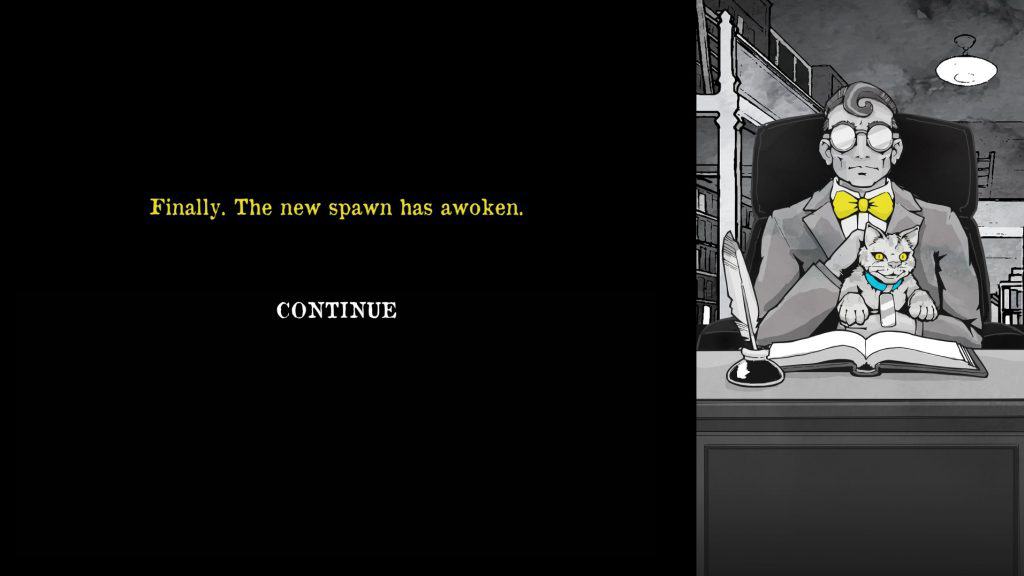
You can follow instructions to a tee, or you can rebel. While instructions from Fate are meant for daily guidance at the end of the day you decide who lives and who dies.
Sometimes it’s really easy to see who deserves to live versus who should get the literal/proverbial ax.
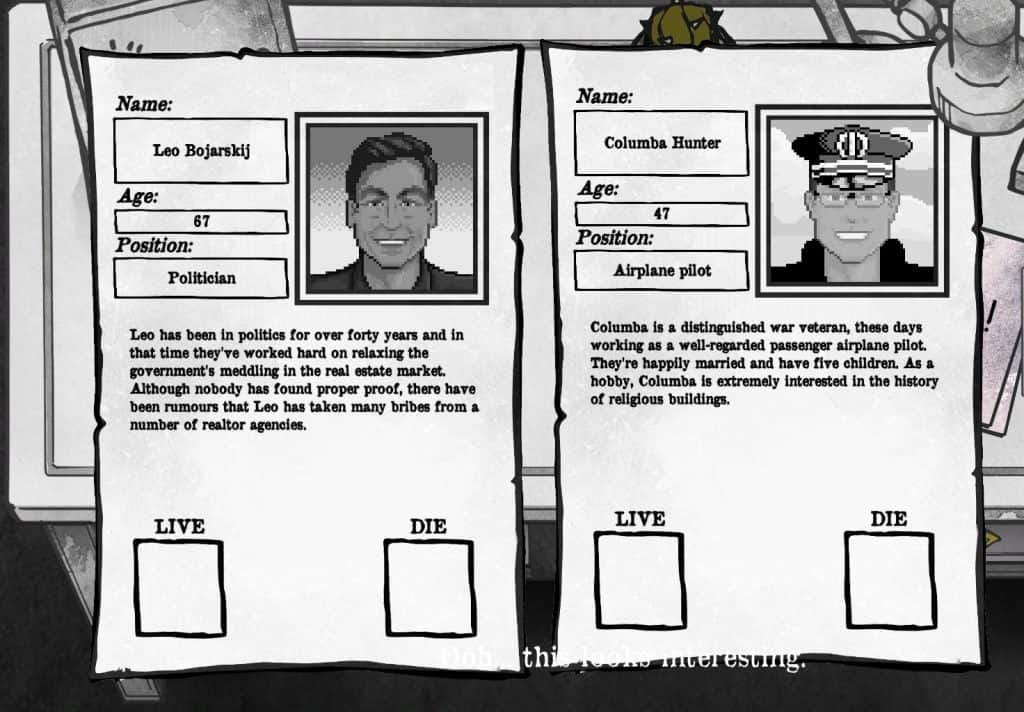
But other times it’s actually not so easy because there’s not necessarily any clear answer, and little moments like that as you find yourself dwelling over who should live and who should die when there’s not an obvious choice. This creates some interesting moral contemplation in a fun game mode – a hard to accomplish feeling that the developers were going for.
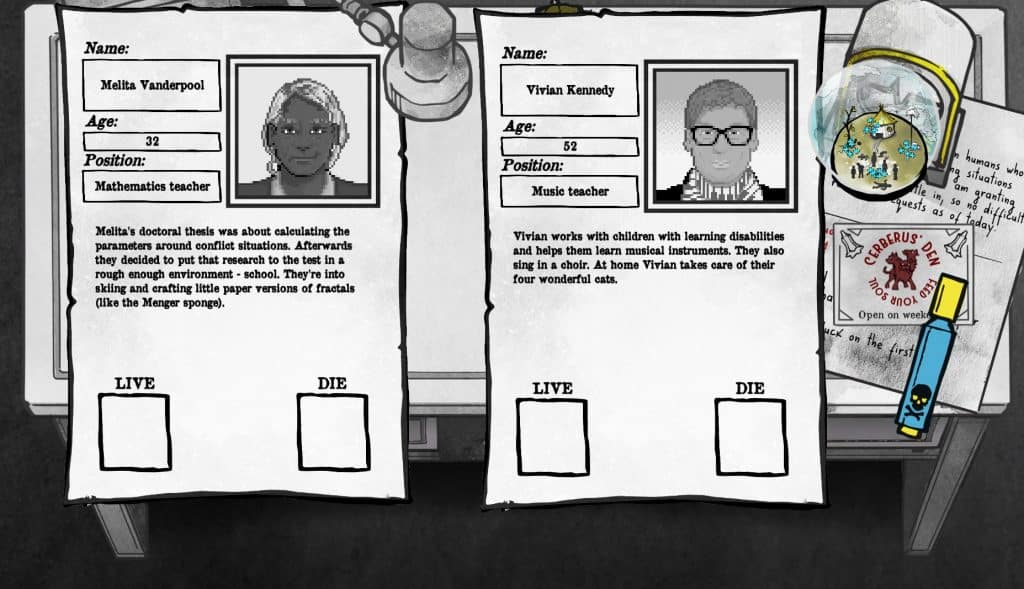
Some people may get a Papers, Please vibe from this game and that’s a flattering comparison that isn’t far off the mark. This game is all about the job…even when that job doesn’t seem like the basis for an entire game somehow something great is created out of something most would consider ordinary.
After making the tough decisions and faxing it in to Fate and his Uber-weird cat you end each day talking to Fate, the head honcho of your local division, in his office. This is where story and plot unfold as your performance is reviewed, your verbal sparring begins, and you get to write the story of your Reaper’s life.
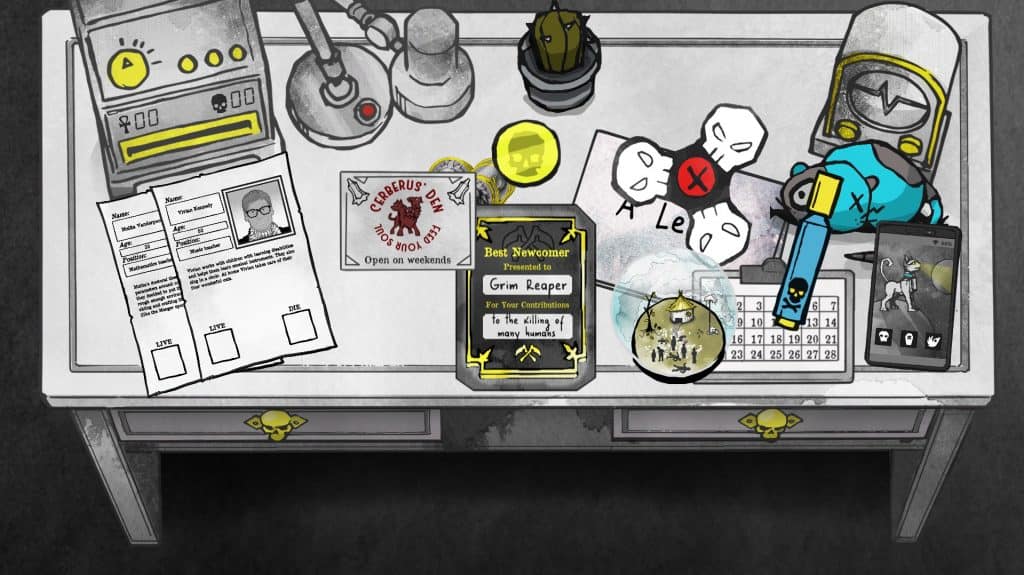
The decisions are what drive the tone of this game forward. Do you support Fate’s musings or insult him? Do you follow the rules, break them all, or end up somewhere in between the two extremes? Do you use your limited pay to buy interesting trinkets from Mortimer, the hobo skeleton pirate running a black market and telling stories from his basement camp setup?
For a very compact set up there’s a decent amount going on, and plenty to explore within that relatively small space.
If you ever read those “Choose Your Own Adventure” book then this game will feel quite familiar to you as the gameplay follows that sort of line.
Oh, and for those of us who bought the game upon release after almost a year the afterlife bar Cerberus’ Den is finally open and available for more plot, story, and interaction since the Halloween 2020 update.
The Good in Death & Taxes
There are a lot of things to like about what Death & Taxes brings to the table as an independent video game. There are both good and bad endings based on the decisions made throughout the game.
The voice acting is very good. Most the voices are enjoyable. Even those that aren’t fit the characters and yes, I hate the voice of the Cloud, too. But that’s the voice for a nagging (not going to say what is is because I don’t believe in spoilers).
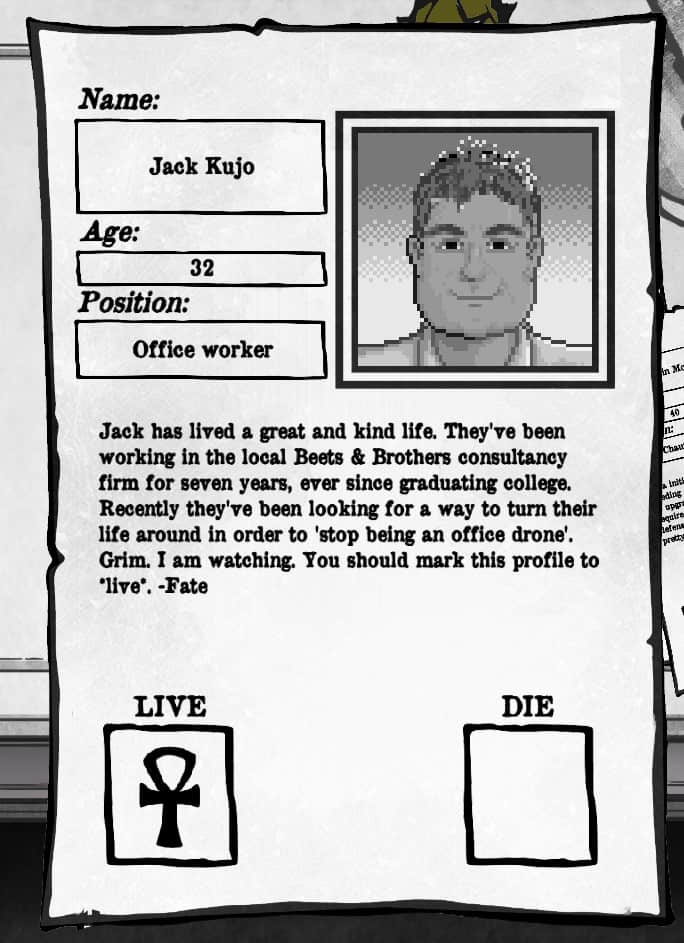
The writing is solid, too. There was obvious clear thought put into this. There are musings on mortality, philosophy, and the various response options means you can be effectively sarcastic, flippant, tired burned out office idiot, or deep reflective office sage.
That’s a nice bit of variety. The small amount of tools offered are useful, and there are some pretty cool hidden gems for those paying attention.
That offers some unique options to a game that is simple in setup but executes so well in that limited space.
And anyone who has ever done programming, wrote haiku poetry, or done anything creative within constraints, you know how challenging that can often be to do well.
Certainly more so than when you can just do what you want.
Graphically the use of limited color is done very effectively, allowing the designers to draw attention to what they want you to look at in the game while also keeping most of the game the dreary gray that really represents the living death of office life to so many of us.
The developers said in multiple interviews that they really wanted to talk about death and deal with the topic in a positive way. That idea of the death positive movement is done really well here.
It doesn’t overwhelm or heavy hand at any point in the game. The game is the game. You play the game, the mechanics are set, and you progress the story based on the decisions you make throughout.
One additional thing I really like: the fact with a new game you have the choice to start a new game with the items bought, money made, or memories from the previous playthrough (New Game+) or you can wipe the slate and start out completely from scratch once again.
It’s a mechanic that probably won’t get used to much as this is a game that is heavy on story, narration, and the experience versus setting up something that plays over and over again. But it’s a really good mechanic, and one that gives everyone a chance to experience every part of the game.
Finally, the Ending Credits are done amazingly well. It’s such a smart idea, and the interaction is amazing. Among the best ending credits of a video game ever, IMO.
Very well done and mixes perfectly with the rest of the package.
Death & Taxes Pros
- Multiple endings
- Awesome creative way to deal with a hard topic – being “death positive”
- The voice acting is very good
- One of the best ending credits scenes EVER – loved it!
- Won Best Game in Estonia in 2020 (Congrats!)
The Bad in Death & Taxes
As much as I really like this game, and love what the developers intended, this wouldn’t be a full and fair review if we didn’t hit with some very clear negatives that exist in this game, as well.
And to make it abundantly clear: I like this game a lot. The experience was different, original, and the writing and voice acting were both quite good. I have absolutely ZERO regrets about buying this game at full price.
But it does have some warts, especially on a second or third playthrough.
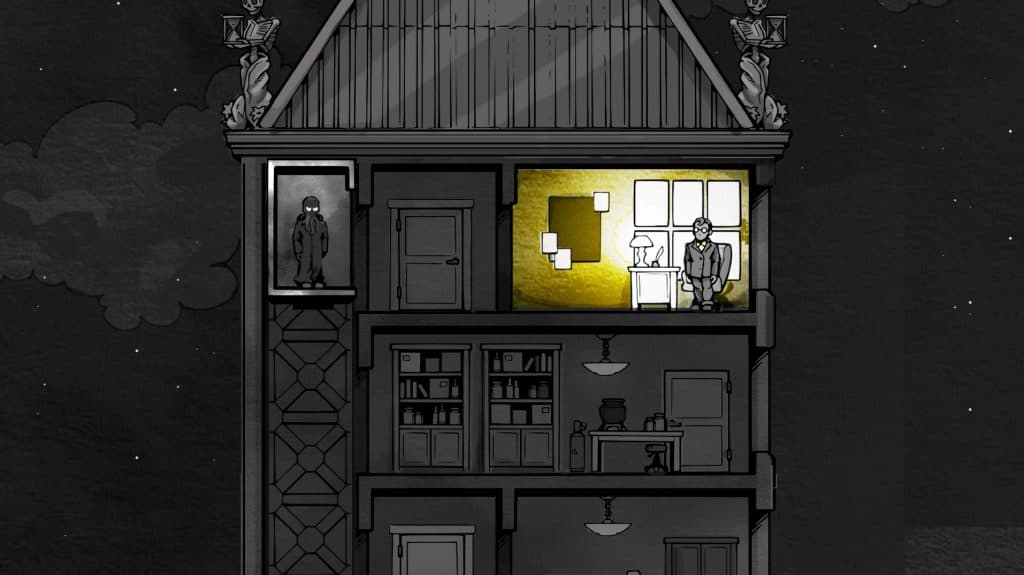
There are some clear moments of railroading. It’s understandable to an extent – the more decisions that can be make the more potential combinations of answers and actions that can occur. So with decision based games it’s often about making the world seem more responsive than it is or going with a mega budget from a studio.
So I get the restrictions, but there are times where it can be jarring. It’s hard to explain it without spoilers but if you make a series of decisions that clearly should result in something like you getting fired, or you blatantly refusing to follow orders, you’ll have a jarring moment where you’re called satisfactory.
While there can be plot reasons for this, it’s still jarring in a way that takes the player out of the immersive world with some playthroughs and that’s a shame.
Sure – this comes up a lot more when you’re playing for a laugh to see how badly you can screw things up, but a few more options or consequences would have been nice and could have saved players from the most jarring of “Wait, that makes no sense,” moments.
Death & Taxes is also absolutely a story based game. Very limited action. This won’t be a con for all gamers, but for some gamers this will be a major strike so it’s important to understand the style of the game.
While the story of this game is really fantastic, it is sort of a one-off or two-off depending on how your first game goes. Because of that, the replay value is low. The developers put their efforts into a game that gives a fantastic unique experience when you engage it for the first time and in tha sense they succeed very, very well.
But if you’re one of those gamers who demands 100 hours of gameplay minimum from every game in their library…well this one isn’t for you.
Death & Taxes Cons
- Clear moments of railroading that can be jarring based on what earlier decisions you made
- Very story based not action based (not necessarily bad but a con for some people)
- The cloud at the mirror is…aggravating. I know it’s supposed to kind of be that way but that could have been dialed back a touch
- Low replay value – After one or two playthroughs it can get a bit grindy or repetitive while playing to unlock other endings
Death & Taxes Is A Unique Gaming Experience
I’ve mentioned this a few items already but it sticks out so much that it really does make sense to mention it one more time in its own section: this is a HARD game to grade. From a pure gameplay perspective, it probably is a game that is a 6 or 6.5 but that feels way too low a grade to me because of how truly wonderful and in-depth the first playthrough experience is.
But rating it with the initial 9 of excitement that comes from a good run through also feels too high for what most gamers expect out of a game rated as a 9.
So what to do?
I’ll do my best to grade in the next section but to make it clear before picking through it all: I’m a big fan of this game and look forward to any DLCs and/or new titles from this studio.

Final Grade for Death & Taxes?
This is a hard one for me. Personally, I think the enjoyment of the first two play throughs were enough that I want to give this a higher grade than I probably should when taking a step back and giving it an honest look. My first instincts when I started playing this game were 8/10 or even 8.5/10, but with a few more playthroughs and really digging in, it probably is closer to a 6/6.5 out of 10, but it’s going to feel much higher on the first playthrough.
If you’re the type of gamer who can play a game once, enjoy a great story and experience, then just walk away to what’s next, the score goes up yet another point. As a one-time experience, it’s a fantastic game and I strongly recommend it.
Shane, all about the Office Aftermath
As a second playthrough while you’re testing out things some tediousness steps in. This is a very mechanics light and story heavy game so once you’ve been through the ins and outs of the story…well this is not a game designed for a lot of second and third playthroughs. As you test more responses, sometimes you get combinations that seem to railroad things through.
In other words, it shows it’s an early major project from a small and relatively knew developer. There are a few cracks, but that doesn’t change the fact that first run through really is something special. There’s something very enjoyable about this different experience of a game that leaves you feeling satisfied by the end.
It gives you an experience, some little things if you want to try out other options, and then after two playthroughs you more or less have seen everything the game has to offer.
So if you have a really limited budget you may want to wait until the game is on sale. If you love good writing and a fascinating story leading to a unique experience, then definitely purchase this game.
I was extremely happy with this game and enjoyed it immensely. You know who gets a full 10/10?
This Guy:
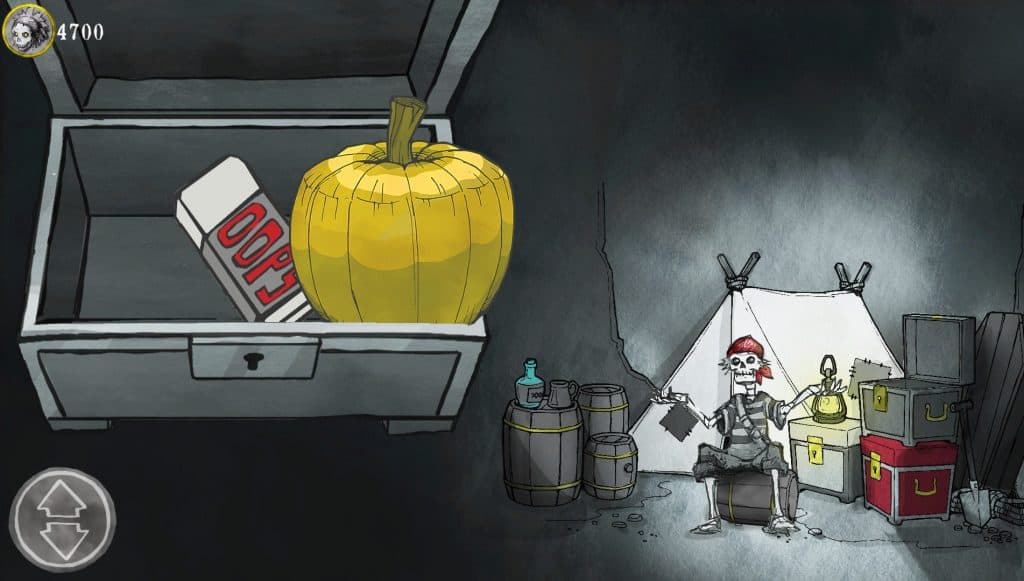
Other Video Game Articles You May Like
- Deadly Days Zombie Roguelite Review
- 17 Tips for My Time at Portia for Beginners
- Can Your Animals Die in Stardew Valley
- 11 Great Indie Games You Missed on Steam
- Best Games Like Stardew Valley

Proud to embrace the locally created moniker of “Corrupt Overlord” from one of the all time great Lords of Waterdeep runs, Shane is one member of the Assorted Meeples crew and will be hard at work creating awesome content for the website. He is a long-time player of board games, one time semi-professional poker player, and tends to run to the quirky or RPG side of things when it comes to playing video games. He loves tabletop roleplaying systems like Dungeons & Dragons, Pathfinder, Werewolf, Fate, and others, and not only has been a player but has run games as DM for years. You can find his other work in publications like Level Skip or Hobby Lark.
